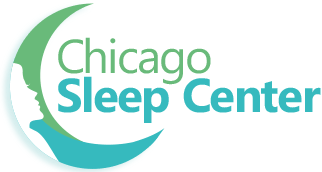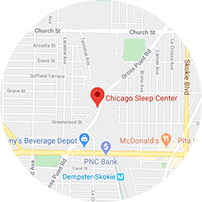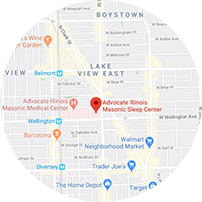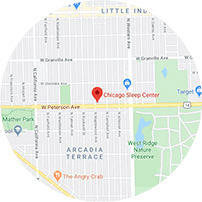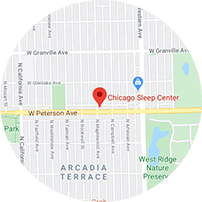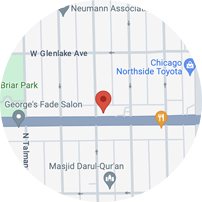Sleep Apnea and Snoring
Do you find it challenging to get a good night’s sleep, no matter what you do? Does your partner complain that you snore and keep them up at night?
Although snoring can seem benign, it’s not and is often a symptom of sleep apnea. At Chicago Sleep Center, our specialists and doctors use a comprehensive approach to improve both your sleep and your health.
Why Do People Snore?
Snoring is the sound that’s made when your airway is partially blocked when you’re sleeping. Usually, this is because the airway is narrowed, sometimes based on how you sleep and how your muscles relax while you’re asleep.
Some people who sleep on their backs are more likely to snore. This is because the base of the tongue is more likely to collapse into the back of the throat. Occasional snoring is expected, but excessive snoring can be a sign of sleep apnea.
What is Sleep Apnea?
Sleep apnea is a sleeping disorder that makes it hard to breathe while you’re sleeping. Sometimes, this happens because the brain doesn’t send the right messages to the muscles that control airflow while you’re asleep.
However, this form of sleep apnea, called Central Sleep Apnea, is rare. The most common kind of sleep apnea is Obstructive Sleep Apnea (OSA). OSA occurs when the airways become partially blocked while you’re sleeping. For most people with OSA, this is usually a result of the throat relaxing too much and narrowing the airway.
OSA is common, but it can be life-threatening. There’s a risk that your airway can become cut off entirely while you’re sleeping. Luckily, there are ways to treat sleep apnea.
How Do You Develop Sleep Apnea?
Anyone can have sleep apnea. Sometimes it’s caused by the shape of your mouth and throat. You could even have sleep apnea due to the position that you sleep in at night. But certain factors put you at higher risk for developing sleep apnea. These factors include:
- Being male
- Being overweight
- Smoking
- Use of depressants such as alcohol and other sedatives
- Frequent nasal congestion
- Having a family history of sleep apnea
- Various medical conditions, including diabetes, hormonal disorders, asthma, and hypertension
If you’re at higher risk for sleep apnea due to these factors, you should examine your sleeping habits and seek treatment if you have sleep apnea symptoms.
How Do You Know If You Have Sleep Apnea?
Common sleep apnea symptoms include excessive snoring, excessive daytime sleepiness, insomnia, trouble focusing, and irritability. If you exhibit some of these symptoms, you should seek professional help.
At Chicago Sleep Centers, our sleep specialists will have you come in and do a sleep study. Completing a sleep study is the only way to diagnose sleep apnea.
From there, we can begin treatment. We offer complete, in-lab sleep studies and at-home sleep studies for sleep apnea at Chicago Sleep Center.
A sleep study is called polysomnography. To complete a sleep study, you’ll go to a special lab and sleep.
While you’re sleeping, you’ll be hooked up to sensors monitoring things like your breathing, heart rate, oxygen saturation, body movements, and brain activity. Completing a sleep study can help our doctors diagnose sleep apnea as well as other sleeping disorders.
An at-home sleep study can be used to diagnose sleep apnea. It’s a simplified test that you can set up yourself at home to monitor your breathing patterns and heart rate.
At-home sleep studies help diagnose sleep apnea without the need for completing a sleep study at a lab, allowing treatment to begin right away. However, a sleep study conducted in a lab may still be needed if an at-home test doesn’t detect irregular breathing patterns present in sleep apnea or only detects mild irregularities.
How is Sleep Apnea Treated?
The primary treatment for sleep apnea is the use of CPAP machines. CPAP stands for Continuous Positive Airway Pressure.
A CPAP machine is a device that connects to a mask that covers the nose and mouth and pushes air through your airways while you sleep. Having enough air moving through your airways ensures that they stay open and don’t collapse.
Although they are highly effective, CPAP machines aren’t the right fit for everyone. Some people have trouble tolerating the device or find it doesn’t provide relief from symptoms.
There are alternative treatments for sleep apnea, and we offer many of them at the Chicago Sleep Center. Sometimes, small changes can help when it comes to sleep apnea or to improving snoring as well.
These changes may include sleeping on your side, as well as practicing better sleep hygiene. Another alternative to a CPAP machine is an oral appliance. These appliances fit in the mouth and are designed to keep the jaw forward, so it’s harder for the airway to collapse.
Minimally invasive surgeries may also be used to treat Obstructive Sleep Apnea. Implants can be placed in the soft palate to stiffen it, making it less likely to collapse while you’re sleeping.
You can also undergo surgical procedures to widen the nasal airway or remove excess tissue in the upper airway. All of these procedures aim to prevent tissue in the mouth, throat, and nose from obstructing the airway.
Chicago Sleep Center also offers our patients a new sleep apnea therapy called Inspire. Inspire is a device that’s implanted in the body and connected to a remote.
When activated, the Inspire device sends a gentle pulse that stimulates the hypoglossal nerve, which controls the muscle that moves the tongue. It ensures that every time you breathe, your tongue moves so it doesn’t block your airway.
Your Chicago Sleep Center sleep specialist will work with you to find the best treatment for you and your unique needs. The most important thing you can do is take the first step by making an appointment at our sleep center so our specialists can assess your symptoms and make an informed diagnosis.
Schedule an appointment now at Chicago Sleep Center in Chicago, IL, and learn more about treating sleep apnea!
Do you know someone who snores?

Obstructive Sleep Apnea Syndrome
Sleep apnea is a medical condition that requires careful attention and proper treatment. This disorder, which can become life-threatening, involves the frequent collapsing of the breathing passageway during sleep. This collapsing can cause a partial or complete blockage of the airway.
Symptoms of sleep apnea include excessive daytime sleepiness, weight gain, sexual dysfunction, and depression. If left untreated, obstructive sleep apnea can often lead to high blood pressure, heart failure, heart attack, and stroke.
Diagnosis
Snoring and obstructive sleep apnea affects millions of Americans, often with significant impact on social relationships, energy levels, and cardiovascular health. Although every patient can be helped, our goal is to identify the precise source of the problem and to use noninvasive office treatments whenever possible as opposed to surgery.
Through recent advances, sleep specialists are now able to detect and diagnose breathing disorders at earlier, more treatable stages. The first step in diagnosis is to conduct a sleep study. A sleep study is used to identify and measure the different stages of sleep, as well as to record and classify various physiological activities and the problems that may be associated with these during sleep.
After the study, a board-certified physician will review and interpret these records to determine whether the patient suffers from sleep apnea, how severe it may be, and how to best proceed with treatment.

